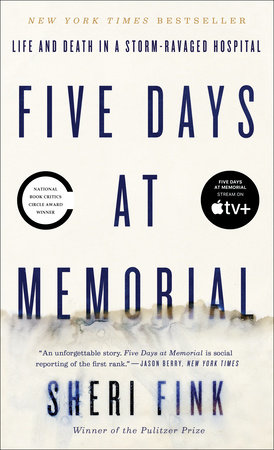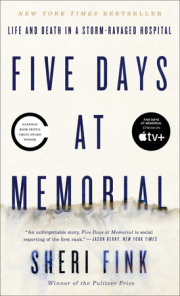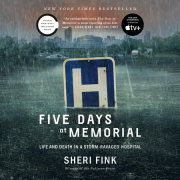Prologue At last through the broken windows, the pulse of helicopter rotors and airboat propellers set the summer morning air throbbing with the promise of rescue. Floodwaters unleashed by Hurricane Katrina had marooned hundreds of people at the hospital, where they had now spent four days. Doctors and nurses milled in the foul-smelling second-floor lobby. Since the storm, they had barely slept, surviving on catnaps, bottled water, and rumors. Before them lay a dozen or so mostly elderly patients on soiled, sweat-soaked stretchers.
In preparation for evacuation, these men and women had been lifted by their hospital sheets, carried down flights of stairs from their rooms, and placed in a corner near an ATM and a planter with wilting greenery. Now staff and volunteers—mostly children and spouses of medical workers who had sought shelter at the hospital—hunched over the infirm, dispensing sips of water and fanning the miasma with bits of cardboard.
Supply cartons, used gloves, and empty packaging littered the floor. The languishing patients were receiving little medical care, and their skin felt hot to the touch. Some had the rapid, thready pulse of dehydration. Others had blood pressures so low their pulses weren’t palpable, their breathing the only evidence of life. Hand-scrawled evacuation priority tags were taped to their gowns or cots. The tags indicated that doctors had decided that these sickest individuals in the hospital were to be evacuated last.
Among them was a divorced mother of four with a failing liver who was engaged to be remarried; a retired church janitor and father of six who had absorbed the impact of a car; a WYES public television volunteer with mesothelioma, whose name had recently disappeared from screen credits; a World War II “Rosie Riveter” who had trouble speaking because of a stroke; and an ailing matriarch with long, braided hair, “Ma’Dear,” renowned for her cooking and the strict but loving way she raised twelve children, multiple grandchildren, and the nonrelatives she took into her home.
In the early afternoon a doctor, John Thiele, stood regarding them. Thiele had taken responsibility for a unit of twenty-four patients after Katrina struck on Monday, but by this day, Thursday, the last of them were gone, presumably on their way to safety. Two had died before they were rescued, and their bodies lay a few steps down the hallway in the hospital chapel, now a makeshift morgue.
Thiele specialized in critical care and diseases of the lungs. A stocky man with a round face and belly, and skinny legs revealed beneath his shorts, friends called him Johnny, and when he smiled, his eyes crinkled nearly shut. He was a native New Orleanian, married at twenty, with three children. He golfed and watched televised sports. He liked to smoke a good cigar while listening to Elvis.
Like many of the hospital staff around him, his association with what was now Memorial Medical Center stretched back decades. He had rotated at the hospital as a Louisiana State University medical student in 1977. A classmate would later say that Johnny Thiele had turned into the sort of doctor they all wished to be: kind, gentle, and understanding, perhaps all the more so for having struggled over the years with alcohol and his moods. When Dr. Thiele passed a female nurse, he would greet her by name with a pat on the back and sometimes call her “kiddo.”
Thiele had pursued part of his training at the big public Charity Hospital, one of the busiest trauma centers in the nation, where he learned, when several paramedics burst into the emergency room in close succession, to attend to the most critical patients first. It was strange to see the sickest here at Memorial prioritized last for rescue. At a meeting Thiele had not attended, a small group of doctors had made this decision without consulting patients or their families, hoping to ensure that those with a greater chance of long-term survival were saved. The doctors at Memorial had drilled for disasters, but for scenarios like a sarin gas attack, where multiple pretend patients arrived at the hospital at once. Not in all his years of practice had Thiele drilled for the loss of backup power, running water, and transportation. Life was about learning to solve problems by experience. If he had a flat tire, he’d later say, he knew how to fix it. If somebody had a pulmonary embolism, he knew how to treat it. There was little in his personal history or education that had prepared him for what he was seeing and doing now. He had no repertoire for this.
He had arrived here on Sunday. He brought along a friend who was recovering from pneumonia and was too weak to comply with the mayor’s mandatory evacuation order for the city, which had exempted hospitals. Early Monday, Thiele awoke to shouts and felt his fourth-story corner office swaying. Its floor- to-ceiling windows, thick as a thumb, moved in and out with the wind gusts, admitting the near-horizontal rain. He and his colleagues lifted computers away and sopped up water with sheets and gowns from patient exam rooms, wringing out the cloth over garbage cans.
The hurricane cut off city power. The hospital’s backup generators did not support air-conditioning, and the temperature climbed. The well-insulated hospital turned dank and humid; Thiele noticed water dripping down its walls. On Tuesday, the floodwaters rose.
Early Wednesday morning, Memorial’s generators failed, throwing the hospital into darkness and cutting off power to the machines that supported patients’ lives. Volunteers helped heft patients to staging areas for rescue, but helicopters arrived irregularly. That afternoon, Thiele sat on the emergency room ramp for a cigar break with an internist, Dr. John Kokemor, who told him doctors were being requested to leave last. When Thiele asked why, he later recalled, his friend brought an index finger to the crook of his opposite elbow and pantomimed giving an injection. Thiele caught his drift.
“Man, I hope we don’t come to that,” Thiele said. Kokemor would later say he never made the gesture, that he had spent nearly all his time outside the building loading hundreds of mostly able- bodied evacuees onto boats, which floated them over a dozen blocks of flooded streets to where they could wade to dry ground. He said he was no longer caring for patients and too busy to worry about what was going on inside the hospital.
Wednesday night, Thiele heard gunshots outside the hospital. He was sure people were trying to kill each other. “The enemy” lurked as near as a credit union building across the street. Thiele thought the hospital would be overtaken, that those inside it had no good way to defend themselves. He lost his footing in an inky stairwell and nearly pitched down the concrete steps before catching himself. Panicked and convinced he would die, he reached his family by cell phone to say good-bye.
Thiele felt abandoned. You pay your taxes and you assume the government will take care of you in a disaster, he thought. He also wondered why Tenet, the giant Texas-based hospital chain that owned Memorial, had not yet sent any means of rescue.
Finally, on Thursday morning, the company dispatched leased helicopters, while other aircraft from the Coast Guard, Air Force, and Navy hovered overhead awaiting a turn to perch on Memorial’s helipad. Airboats came and went with the earsplitting drone of airplane engines.
The pilots would not allow pets on board the aircraft and watercraft, creating stressful choices for the staff members who had brought them to the hospital for the storm. A young internist held a Siamese cat as Thiele felt for its breastbone and ribs and conjured up the anatomy he had learned in a college dissection class. He aimed the syringe full of potassium chloride at the cat’s heart. The animal wriggled free of the doctor’s hands and swiped and tore Thiele’s sweat-soaked scrub shirt. Its whitish fur stuck to him. They caught the animal and tried again to euthanize it, working in a hallway perhaps twenty feet away from the patients in the second-floor lobby. It was craziness.
A tearful doctor came to Thiele with news she had been offered a spot on a boat with her beautiful twenty-pound sheltie. She had quickly trained it to lie in a duffel bag. Several of the doctor’s human companions were insisting they would not leave without her. The doctor had been sick to her stomach and continuously afraid. She wanted to go while she had this chance, but she felt guilty about abandoning her colleagues and the remaining patients. “Don’t cry, just go,” Thiele said. “An animal’s like a child.” He reassured her: “We gonna get by without you. I promise you.”
Thiele walked back and forth through the second-floor lobby multiple times as he journeyed between the hospital and his medical office. As the hours passed, the volunteers fanning the patients on their stretchers were shooed downstairs to join an evacuation line snaking through the emergency room.
Thiele knew nothing about the dozen or so patients who remained, but they made an impression on him. Before the storm, the poor souls would have had a chance. Now, after days in the inferno with little to no medications or fluids, they had deteriorated.
Copyright © 2016 by Sheri Fink. All rights reserved. No part of this excerpt may be reproduced or reprinted without permission in writing from the publisher.










